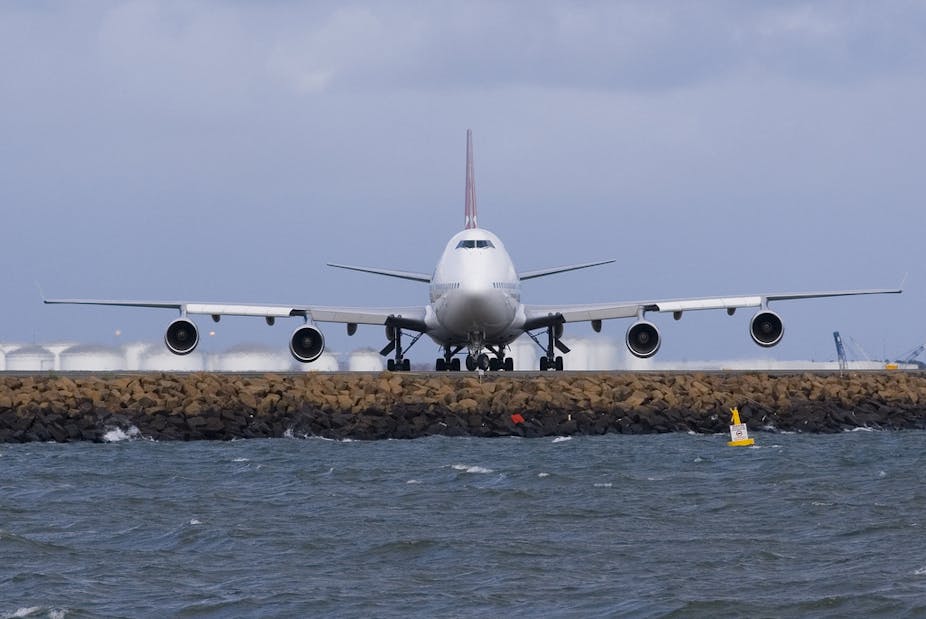The Federal Government appears ready to “throw a lifeline” to Qantas, which has been seeking a government-backed debt guarantee and a lifting of the 49% foreign ownership limit in the Qantas Sale Act.
Although the government is yet to announce any assistance ahead of Qantas’ financial results on February 27, Treasurer Joe Hockey says the airline’s request for assistance meets four essential preconditions:
- existing restrictions on the business imposed by the Parliament
- an essential national service
- an environment where other sovereigns are engaging in direct competition to the massive disadvantage of an Australian business.
And finally, in the words of Mr Hockey:
The business has to do its own heavy lifting on its own reform. We are not going to run the business or tell them how to reform.
The Qantas Sale Act legislated for the privatisation of Qantas at a time when large scale privatisations were deemed to be desirable. It included setting restrictions on foreign ownership meaning:
- no more than 49% of Qantas can be owned by foreign persons
- no more than 35% can be owned by a foreign airline
- no one foreign person own more than 25%
- no more than one third of the directors can be voted in by those representing foreign shareholdings.
Qantas is also required to maintain a register of shares in which foreign persons have a relevant interest.
Presumably if the Qantas Sale Act were repealed, the heavy lifting on foreign ownership would be left to the Foreign Investment Review Board (FIRB) as it is for other businesses in Australia. FIRB could potentially reject, as contrary to the national interest, foreign investment proposals above the current threshold of A$248 million. The threshold for investment from American or New Zealand interests is higher at A$1078 million.
A proposal of any value by foreign governments, including other government-owned airlines, would be subject to review by FIRB. Rejection does not happen very often, but competition regulation could also apply.
Is Qantas ‘essential’?
Referring to Qantas as “an essential national service” might suggest a debt guarantee or other financial support is more palatable to the government than increased foreign ownership.
US multinational Archer Daniels Midland’s bid for Australian grain handler GrainCorp, knocked back by the FIRB, is a case in point.
The Qantas case has similarities to GrainCorp in economic terms. They are both infrastructure services that are crucial to economic activity. They are both networks. In the case of airlines this means the addition of one more destination can add more than proportionately to the value of the business, although this depends on travel density. There is also a tendency to natural monopoly because costs fall as the scale of operation gets larger. This is why policy has favoured keeping at least two airlines operating on low density Australian routes, in order to maintain competition.
Facing up to global competition
Qantas does face competition from government-owned airlines, at least on international routes. Government-owned airlines which operate on similar routes to Qantas include Air New Zealand, Emirates, Garuda, Malaysian, and Singapore. Qantas itself was government owned until 1995.
Airlines are an infrastructural service industry where government ownership is frequent. This is because the service is regarded as crucial, yet it tends to alternate between profits and losses. The activity is inherently commercially unstable because the costs of provision aren’t always covered by sales revenue. Yet the overall benefits to society remain greater than the costs of providing the service.
Yet Qantas also faces competition from private airlines. These tend to be owned by firms operating in a range of activities and/or the airlines frequently go broke or merge. This lends to the instability which may be regarded as against the national interest, as in the current issue with Qantas.
The suggestion that the government guarantees the debt of Qantas amounts to de facto government ownership in that activities become subject to a “soft budget constraint” and would be covered from government coffers. However it differs from government ownership because it would not offer the controls for the locations of maintenance and operations, workforce etc. that government ownership would offer.
Who’s really in charge?
Joe Hockey’s claim that Qantas would have to manage its own reform is an escape clause. Perversely, a debt guarantee would leave the possibility that Qantas avoids commercial constraint but at the same time there is no requirement of its conduct. Alternatively, increased foreign ownership could be allowed, but this presents problems for the view of it as an essential national service.
Qantas cannot have it both ways. Qantas chief Alan Joyce seeks a government debt guarantee without which he argues Qantas cannot remain a national carrier. This would offer the benefits to the business that government owned airlines get, but without the quid pro quo where the government requires the carrier to operate in the national interest, for instance in choosing the location of maintenance facilities, and workforce conditions.

